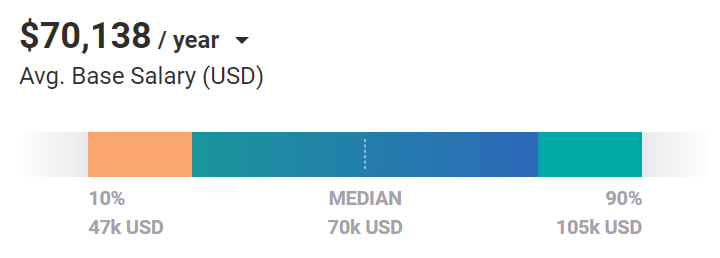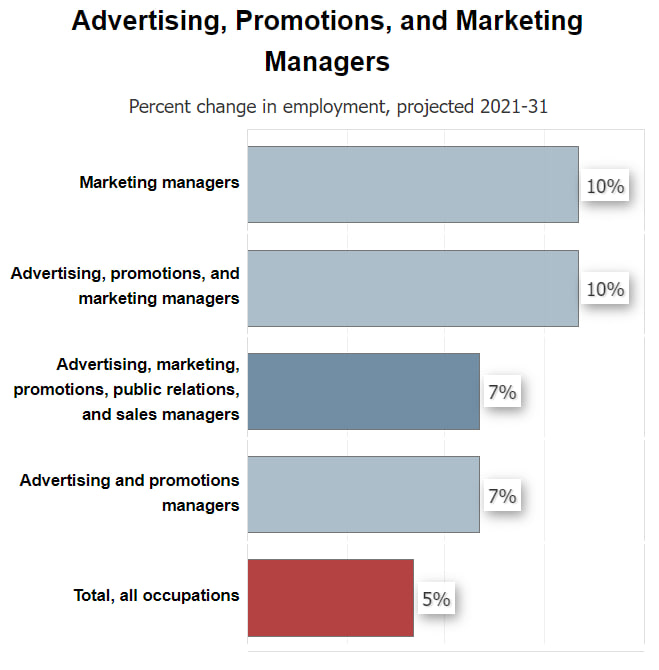The A to Z Guide to Marketing Management: Everything You Need to Know to Succeed

Marketing is an essential component of any successful business, and Marketing Managers are responsible for developing and executing effective marketing strategies to promote products and services. This article provides a comprehensive overview of the role of Marketing Managers, including their responsibilities, qualifications, salary expectations, work environment, education and training, career options, demand, and the pros and cons of the job. As the business landscape continues to evolve, Marketing Managers play a crucial role in driving business growth and achieving organizational goals. This article is an excellent resource for anyone interested in pursuing a career in marketing or for those who want to better understand the role of Marketing Managers in today's business world.
Position Overview
A Marketing Manager is a professional responsible for planning, executing, and monitoring marketing campaigns and strategies to promote a product or service. They analyze market trends, identify target audiences, develop marketing plans, and oversee the implementation of those plans. Marketing Managers also collaborate with other departments within a company to ensure that marketing strategies align with the overall business objectives. They may be involved in managing budgets, conducting market research, and measuring the success of marketing initiatives. Marketing Managers can work in a variety of industries, from consumer goods and retail to technology and healthcare.

Key Qualifications and Skills
The key qualifications and skills for a Marketing Manager include:
- Education: A bachelor's degree in marketing, business administration, or a related field is typically required. Some companies may prefer candidates with a master's degree.
- Experience: Several years of experience in marketing or a related field is necessary to become a Marketing Manager. This may include experience in advertising, public relations, brand management, or market research.
- Strategic Thinking: Having strong analytical skills and the ability to think strategically. Marketing Managers should be able to analyze market trends and customer data to develop effective marketing campaigns.
- Communication Skills: Marketing Managers need excellent communication skills to effectively communicate with team members, clients, and customers. They should be able to write clear and concise marketing plans and presentations.
- Leadership Skills: Marketing Managers must have strong leadership skills to manage a team of marketing professionals effectively. They should be able to motivate and inspire their team to achieve their goals.
- Creativity: Marketing Managers must be creative and innovative in developing marketing campaigns that stand out in a crowded marketplace.
- Technology Proficiency: Marketing Managers should be familiar with digital marketing tools and technologies, including social media platforms, email marketing, and marketing automation software.
- Budget Management: Marketing Managers need to have experience in managing budgets and allocating resources to marketing campaigns to ensure maximum return on investment (ROI).
Interesting fact:
The most common industry for marketing managers is advertising, public relations, and related services, followed by management of companies and enterprises, and then wholesale trade.
Tasks and Expectations
The tasks and expectations of a Marketing Manager can vary depending on the organization they work for and the specific industry. However, some common of them include:
Tasks and Expectations | Description |
Developing Marketing Strategies | Marketing Managers are responsible for developing and implementing marketing strategies that align with the organization's overall goals and objectives. This may involve analyzing market trends, identifying target audiences, and developing campaigns to reach those audiences. |
Managing Marketing Campaigns | Marketing Managers oversee the execution of marketing campaigns, including advertising, digital marketing, and social media. They ensure that campaigns are delivered on time, within budget, and meet the desired results. |
Conducting Market Research | Marketing Managers conduct market research to understand customer needs, preferences, and behaviors. This information is used to develop effective marketing campaigns and to identify new business opportunities. |
Collaborating with Other Departments | Marketing Managers work closely with other departments within the organization, such as sales, product development, and customer service, to ensure that marketing initiatives align with business objectives. |
Managing Budgets | Marketing Managers are responsible for managing budgets and ensuring that resources are allocated effectively to achieve maximum ROI. |
Analyzing Data | Marketing Managers use data analytics to measure the success of marketing campaigns and to identify areas for improvement. They use this data to adjust campaigns and improve future initiatives. |
Managing Teams | Marketing Managers may be responsible for managing teams of marketing professionals, providing guidance, mentorship, and training. |
Overall, a Marketing Manager is expected to be a creative, strategic thinker who can develop and execute effective marketing campaigns that drive business growth and achieve organizational goals. They must have strong leadership skills, be able to collaborate effectively with other departments, and have a deep understanding of marketing trends and technologies.
Compensation
The salary of a marketing manager in the US can vary depending on factors such as the size and industry of the company, location, years of experience, and level of education. According to data from Payscale, the average salary for a marketing manager in the US is around $70,000 per year. However, this can range from as low as $47,000 to over $105,000 per year.

Source: Payscale
Salaries for marketing managers can be higher in certain cities such as San Francisco, New York, and Los Angeles due to the higher cost of living in those areas. Additionally, those with specialized skills or experience in certain areas such as digital marketing, brand management, or market research may also have higher salaries.
Strategies for Increasing Income
Here are some ways a marketing manager can increase their earnings:
- Improve skills and education: Consider pursuing additional education, certifications, or training programs to enhance your skills and knowledge. This can make you more marketable and increase your value to potential employers, which may lead to higher salaries.
- Specialize in a niche: Become an expert in a specific area of marketing, such as digital marketing, content marketing, or social media marketing. This can make you a more valuable asset to your company and can potentially lead to higher-paying roles.
- Negotiate salary: Don't be afraid to negotiate your salary when starting a new job or during annual reviews. Research the average salary for your position and experience level and be prepared to make a case for why you deserve to earn more.
- Seek promotions: Look for opportunities to advance within your company or take on additional responsibilities that may come with a higher salary.
- Consider freelance or consulting work: If you have specialized skills or experience, consider freelancing or consulting on the side. This can be a way to earn additional income and build your reputation in the industry.
- Network and build relationships: Attend industry events and conferences, join professional organizations, and build relationships with other professionals in your field. This can lead to job opportunities, referrals, and higher-paying positions.
Interesting fact:
The most important aspect of a marketing manager's job is driving revenue growth - 73% of marketing managers said that revenue growth was their top priority.
Supplementary Perks
In addition to a base salary, marketing managers may be eligible for various benefits, which can vary depending on the company and location. Here are some common benefits that marketing managers may receive:
- Health and dental insurance: Many companies offer health and dental insurance to their employees, which can include coverage for medical expenses, dental procedures, and prescription drugs.
- Retirement benefits: Some companies offer retirement plans such as a 401(k) or pension plan, which can help employees save for their future.
- Paid time off: Marketing managers may be eligible for paid time off, such as vacation days, sick days, and holidays.
- Flexible schedules: Depending on the company, marketing managers may be able to work flexible schedules or have the option to work remotely.
- Professional development opportunities: Many companies offer professional development opportunities such as training programs, conferences, and tuition reimbursement, which can help marketing managers continue to learn and grow in their careers.
- Performance bonuses: Marketing managers may be eligible for performance bonuses based on their individual or team performance.
- Stock options: Some companies may offer stock options or equity as a way to incentivize and reward employees.
- Relocation assistance: If a marketing manager needs to relocate for a new job, some companies may offer relocation assistance, such as covering moving expenses or temporary housing.
It's important to note that not all companies offer these benefits, and the specifics of each benefit can vary. It's important to review a company's benefits package before accepting a job offer.
Work Environment
This section will provide an overview of the work environment settings, the tools and technologies commonly used by marketing managers. Understanding these work environment settings, tools and technologies is important for marketing managers to effectively manage marketing campaigns, analyze data, and make informed decisions that drive business growth.

Photo: DCStudio/Freepik
Work Environment Settings
Marketing managers typically work in a variety of settings, including:
Work Environment Settings | Description |
Office | Many marketing managers work in an office setting, either at the headquarters of the company they work for or in a separate office space. In this setting, they may have their own office or share a workspace with others. |
Remote | With the increasing availability of technology, many marketing managers work remotely, meaning they work from home or another location outside of the office. In this setting, they may communicate with colleagues and clients through video conferencing or messaging tools. |
Travel | Some marketing managers may have a job that requires frequent travel, such as attending trade shows, visiting clients, or overseeing marketing campaigns in different locations. |
Collaborative | Marketing managers often work closely with other team members, such as graphic designers, copywriters, and social media specialists. In this collaborative setting, they may work in a shared workspace or utilize digital tools to communicate and collaborate on projects. |
Fast-paced | The marketing industry can be fast-paced, and marketing managers may need to work quickly and efficiently to meet deadlines and stay ahead of competitors. In this setting, they may need to be comfortable with multitasking and working under pressure. |
Marketing managers should be comfortable working in a variety of settings and able to adapt to different work environments depending on the needs of their company and clients.
Interesting fact:
63% of marketing managers have a master's degree or higher.
Tools and Technologies
Marketing managers use a variety of tools and technologies to carry out their job responsibilities, including:
- Customer Relationship Management (CRM) software: This software helps marketing managers track and manage customer interactions and data, including sales data, customer demographics, and buying patterns.
- Social media management tools: Social media has become an increasingly important part of marketing, and marketing managers often use tools to manage social media accounts, schedule posts, and analyze social media data.
- Email marketing software: Email marketing is a common tactic used by marketing managers, and software such as Mailchimp, Constant Contact, or Hubspot is used to manage email lists, create email campaigns, and track engagement.
- Analytics tools: Analytics tools such as Google Analytics and Adobe Analytics are used to track website traffic, user behavior, and other important metrics that help marketing managers make data-driven decisions.
- Project management software: Marketing managers often oversee multiple projects and campaigns simultaneously, and project management tools such as Trello, Asana, or Basecamp are used to manage tasks, deadlines, and team collaboration.
- Design software: Marketing managers may need to create graphics, flyers, social media posts, and other visuals to promote their products or services. Tools such as Adobe Creative Suite or Canva are commonly used for designing and creating visual content.
- Marketing automation software: Automation tools like Marketo, Pardot, or Hubspot are used to streamline and automate marketing tasks such as lead generation, lead nurturing, and email campaigns.
The tools and technologies used by marketing managers depend on the specific needs of their organization and their marketing strategy.
Education and Training
Education and training for marketing managers typically includes a combination of academic qualifications, practical experience, and ongoing professional development.
- Academic Qualifications: Many marketing managers have a bachelor's or master's degree in marketing, business administration, or a related field. These degree programs provide a strong foundation in marketing principles, market research, consumer behavior, and strategic planning.
- Practical Experience: Hands-on experience is crucial for marketing managers. Entry-level marketing positions, such as marketing coordinator or marketing assistant, can provide the necessary experience and exposure to the industry. Additionally, internships and co-op programs can help aspiring marketing managers gain practical experience.
- Professional Development: To stay up-to-date on the latest trends and technologies, marketing managers must engage in ongoing professional development. This can include attending industry conferences and trade shows, participating in training programs and workshops, and pursuing industry certifications.

Photo: ijeab/Freepik
Some of the specific skills and knowledge areas that marketing managers should focus on include:
- Digital Marketing: With the increasing importance of digital marketing, marketing managers should have a strong understanding of social media marketing, search engine optimization (SEO), pay-per-click (PPC) advertising, and email marketing.
- Market Research: To make informed decisions, marketing managers must have a deep understanding of their target audience. This requires proficiency in market research techniques, including surveys, focus groups, and data analysis.
- Brand Management: Marketing managers are responsible for developing and maintaining the organization's brand image. This requires a strong understanding of branding principles, including brand identity, messaging, and positioning.
- Strategic Planning: Marketing managers must be able to develop and execute strategic marketing plans that align with the organization's overall goals and objectives. This requires a strong understanding of marketing analytics, budgeting, and project management.
Overall, a combination of academic qualifications, practical experience, and ongoing professional development is essential for marketing managers to succeed in their roles.
Advancement Opportunities
Marketing is a dynamic and evolving field that offers a wide range of career opportunities. As a Marketing Manager, you have the potential to climb the career ladder and pursue various specializations within the industry. This section provides an introduction to the Marketing Manager's Career Ladder, outlining the typical progression from an entry-level Marketing Coordinator to a Chief Marketing Officer. Additionally, it explores some of the most common specializations in the marketing industry. Finally, this section also highlights other career possibilities that Marketing Managers can explore. Whether you're looking to advance your career in marketing or explore other career paths, this section can help you navigate the many opportunities available.

Photo: katemangostar/Freepik
Marketing Manager’s Career Ladder
As a Marketing Manager, your career path can vary depending on your personal goals, interests, and the company you work for. However, here is a general career ladder you can expect to climb as a Marketing Manager:
1. Marketing Coordinator or Specialist
This is typically an entry-level position that involves supporting the Marketing Manager in various tasks, such as social media management, content creation, and event coordination.
2. Marketing Manager
As a Marketing Manager, you will oversee the development and execution of marketing campaigns and strategies, manage a team of marketing professionals, and report to upper management on marketing metrics and ROI.
3. Senior Marketing Manager or Director
In this role, you will be responsible for managing multiple marketing teams, developing long-term marketing strategies, and collaborating with other departments to achieve company-wide goals.
4. Vice President of Marketing
As a VP of Marketing, you will oversee all marketing operations for a company, develop and execute marketing strategies, and work with other executives to ensure company-wide success.
5. Chief Marketing Officer
As a CMO, you will be responsible for the overall marketing vision and strategy of a company. You will work closely with the CEO and other executives to ensure that marketing initiatives align with the company's goals and objectives.
Keep in mind that the above career ladder is not set in stone and can vary depending on the company you work for, your specific goals and interests, and the industry you work in. However, it provides a general idea of the career progression you can expect in the field of marketing.
Specializations in Marketing Industry
There are various specializations in the field of marketing that you can pursue, depending on your interests, skills, and career goals. Here are some of the most common specializations in the marketing industry:
Specializations | Description |
Digital Marketing | Digital marketing involves promoting products or services through digital channels such as search engines, social media, email, and websites. |
Content Marketing | Content marketing involves creating and distributing valuable and relevant content to attract and retain a target audience. |
Brand Management | Brand management involves creating, maintaining, and enhancing a company's brand image and reputation. |
Market Research | Market research involves collecting and analyzing data about customers, competitors, and market trends to inform marketing decisions. |
Product Marketing | Product marketing involves developing and executing marketing strategies for new or existing products. |
Advertising | Advertising involves creating and placing advertisements to promote products or services through various media channels. |
Sales and Business Development | Sales and business development involves identifying and pursuing new business opportunities and closing deals with customers. |
Depending on your career goals and interests, you may choose to specialize in one or more of these areas. It's important to continuously learn and adapt as the marketing industry evolves to stay competitive in your career.
Interesting fact:
The most successful marketing managers are able to balance creativity with data-driven decision-making - high-performing marketing teams are 3.3 times more likely to be data-driven than their low-performing counterparts.
Other Career Possibilities
If you have experience in marketing, but you're interested in exploring other career options, there are several paths you can consider. Here are a few possibilities:
- Sales: If you enjoy working directly with clients and customers, a career in sales may be a good fit. Many of the skills you've developed in marketing, such as communication, persuasion, and relationship building, are valuable in sales.
- Public Relations: If you enjoy working with media and managing a company's reputation, a career in public relations may be a good fit. Many of the skills you've developed in marketing, such as communication and strategic thinking, are valuable in public relations.
- Business Development: If you enjoy identifying new business opportunities and building partnerships, a career in business development may be a good fit. Many of the skills you've developed in marketing, such as market research and strategic thinking, are valuable in business development.
- Product Management: If you enjoy developing and launching new products, a career in product management may be a good fit. Many of the skills you've developed in marketing, such as market research and product positioning, are valuable in product management.
- Entrepreneurship: If you're interested in starting your own business, your marketing background can be a valuable asset in developing a successful business plan and executing a marketing strategy.
These are just a few examples of the career paths you can explore with a background in marketing. It's important to evaluate your skills, interests, and values to determine which path is the best fit for you.
Employment Trends
This section covers two important topics related to marketing managers in the United States: the demand for marketing managers and the availability of flexible and remote work arrangements. Here, we will explore both of these topics in more detail.
Marketing Manager Demand
According to the U.S. Bureau of Labor Statistics, employment of marketing managers was projected to grow 10 percent from 2021 to 2031, which is much faster than the average for all occupations.

Source: U.S. Bureau of Labor Statistics, Employment Projections program
This growth is driven by the increasing importance of marketing in today's business landscape, as well as the continued expansion of digital marketing channels. Marketing managers are needed to create and implement marketing strategies across multiple channels, analyze data to measure campaign effectiveness, and manage marketing teams.
In addition, marketing managers with skills in areas such as social media marketing, content marketing, and analytics are in particularly high demand. Companies are looking for professionals who can help them navigate the ever-changing digital marketing landscape and achieve their marketing goals.
The demand for marketing managers in the United States is expected to remain strong in the coming years as businesses continue to prioritize their marketing efforts to reach and engage with customers.
Flexible and Remote Work Arrangements
Marketing managers often have the opportunity to work flexible and remote arrangements. With the advancements in technology and the widespread adoption of digital marketing channels, many marketing tasks can be completed from anywhere with an internet connection.
Flexible work arrangements, such as telecommuting or flexible hours, allow marketing managers to better balance their work and personal responsibilities. Remote work can also help companies attract and retain top talent, as it allows them to tap into a wider pool of candidates who may not be able to relocate for a job.
However, remote work arrangements can come with their own challenges, such as communication and collaboration issues. Marketing managers who work remotely must ensure they have the right tools and processes in place to stay connected with their team members and stay up-to-date on the latest developments in their industry.
Overall, flexible and remote work arrangements can be a great option for marketing managers, as long as they have the right skills and tools to succeed in a remote environment.
Interesting fact:
Many marketing managers work long hours, with 32% reporting working more than 50 hours per week.
Job Fulfillment
In this section, we will discuss the pros and cons of a marketing manager job. By understanding both the benefits and drawbacks of this role, you can make an informed decision about whether a marketing manager job is right for you.
Pros of a Marketing Manager Job | Cons of a Marketing Manager Job |
High Demand Marketing managers are in high demand across various industries, making it easier to find job opportunities. | Pressure and Stress Marketing managers are often under pressure to meet deadlines, achieve targets, and manage budgets, which can lead to high levels of stress. |
Creative Freedom The role of a marketing manager is highly creative, providing ample opportunities for personal expression and innovation. | Long Hours Marketing managers may be required to work long hours, including evenings and weekends, to meet project deadlines. |
High Income Potential Marketing managers often receive competitive salaries and benefits, making it a lucrative career option. | Uncertainty The success of marketing campaigns is not always guaranteed, which can lead to uncertainty about job security. |
Job Variety Marketing managers may work on a variety of projects, such as advertising, public relations, social media, and event planning. | Competitive Field The marketing field is highly competitive, and marketing managers may need to constantly update their skills and knowledge to remain relevant. |
Professional Growth Marketing managers may have opportunities for professional growth, such as promotions and leadership roles. | Challenging Communication Marketing managers may need to communicate complex or technical information to non-marketing stakeholders, which can be challenging. |

Photo: DCStudio/Freepik
In conclusion, Marketing Managers are vital to the success of any organization. They are responsible for developing and executing effective marketing strategies to promote products and services, analyzing market trends, managing budgets, and collaborating with other departments. This article has provided an in-depth overview of the role of Marketing Managers, including their qualifications, salary expectations, work environment, education and training, career options, demand, and the pros and cons of the job. As the business landscape continues to evolve, Marketing Managers must stay up-to-date with the latest trends and technologies in marketing to remain competitive. With their leadership, strategic thinking, and communication skills, Marketing Managers are essential for driving business growth and achieving organizational goals.
- Marketing Managers are responsible for developing and executing effective marketing strategies to promote products and services.
- They analyze market trends, manage budgets, and collaborate with other departments to ensure that marketing initiatives align with business objectives.
- Key qualifications for a Marketing Manager include a bachelor's degree in marketing or a related field, several years of experience in marketing, strong strategic thinking and communication skills, leadership skills, creativity, proficiency with technology, and budget management skills.
- Salary expectations for a Marketing Manager in the US can range from $47,000 to over $105,000 per year, depending on various factors such as industry, location, experience, and education.
- Marketing Managers work in a variety of settings, including offices, remote locations, and collaborative environments, and use a range of tools and technologies such as CRM software, social media management tools, analytics tools, project management software, and marketing automation software.
- Education and training for Marketing Managers include academic qualifications, practical experience, and ongoing professional development.
- Career options available to Marketing Managers include a typical progression from an entry-level Marketing Coordinator to a Chief Marketing Officer, as well as specializations within the industry such as Digital Marketing, Content Marketing, Brand Management, Market Research, Product Marketing, Public Relations, Advertising, and Sales and Business Development.
- Marketing Managers are in high demand due to the increasing importance of marketing in the business landscape and the growth of digital marketing channels. They often have the opportunity to work flexible and remote arrangements, which can help them balance work and personal responsibilities.
- The advantages of a Marketing Manager job include high demand, creative freedom, high income potential, job variety, and professional growth opportunities, while the disadvantages include pressure and stress, long hours, uncertainty about job security, a competitive field, and challenging communication.
FAQ
What are some common challenges faced by marketing managers?
Some common challenges faced by marketing managers include staying up-to-date with new technologies and trends, managing budgets effectively, balancing short-term and long-term goals, measuring the ROI of marketing campaigns, and dealing with unexpected market changes or crises.
How do I prepare for a marketing manager job interview?
To prepare for a marketing manager job interview, you should research the company and industry, review the job description and qualifications, practice answering common interview questions, and be prepared to discuss your relevant experience and skills. You should also bring copies of your resume and any relevant work samples or portfolio items.
How important is creativity in marketing management?
Creativity is an important aspect of marketing management, as it can help to differentiate a brand from its competitors and make marketing campaigns more engaging and memorable for consumers. However, creativity alone is not enough - marketing managers must also be strategic and data-driven in their approach to ensure that campaigns are effective in achieving business goals.
How can a marketing manager stay up-to-date with new trends and technologies in the industry?
To stay up-to-date with new trends and technologies in the industry, a marketing manager can attend industry events and conferences, participate in webinars and online training courses, read industry publications and blogs, network with other professionals, and engage with thought leaders on social media. They can also encourage their team to stay up-to-date and share their knowledge and insights with each other.